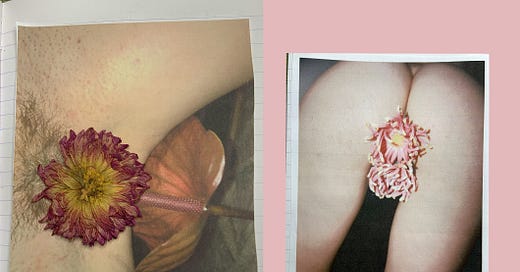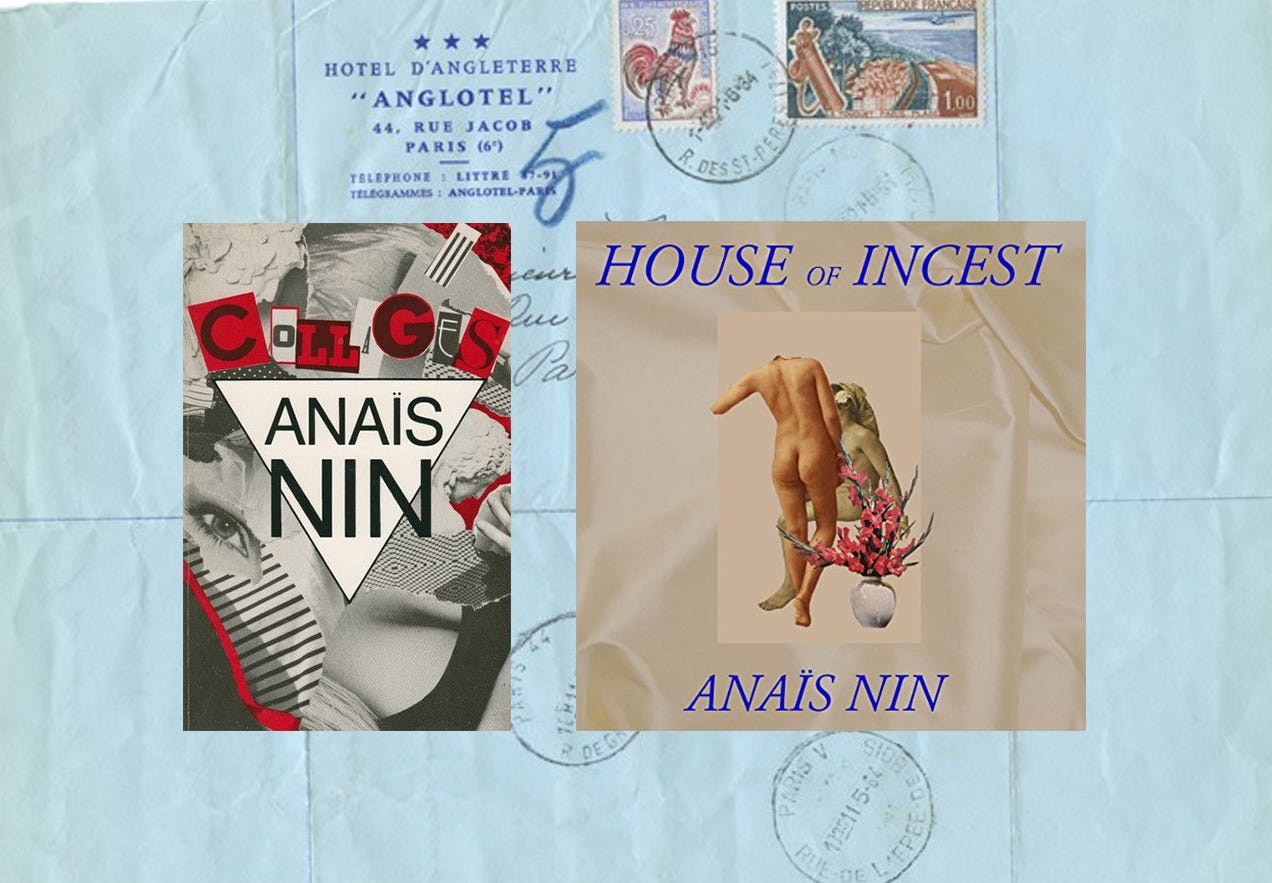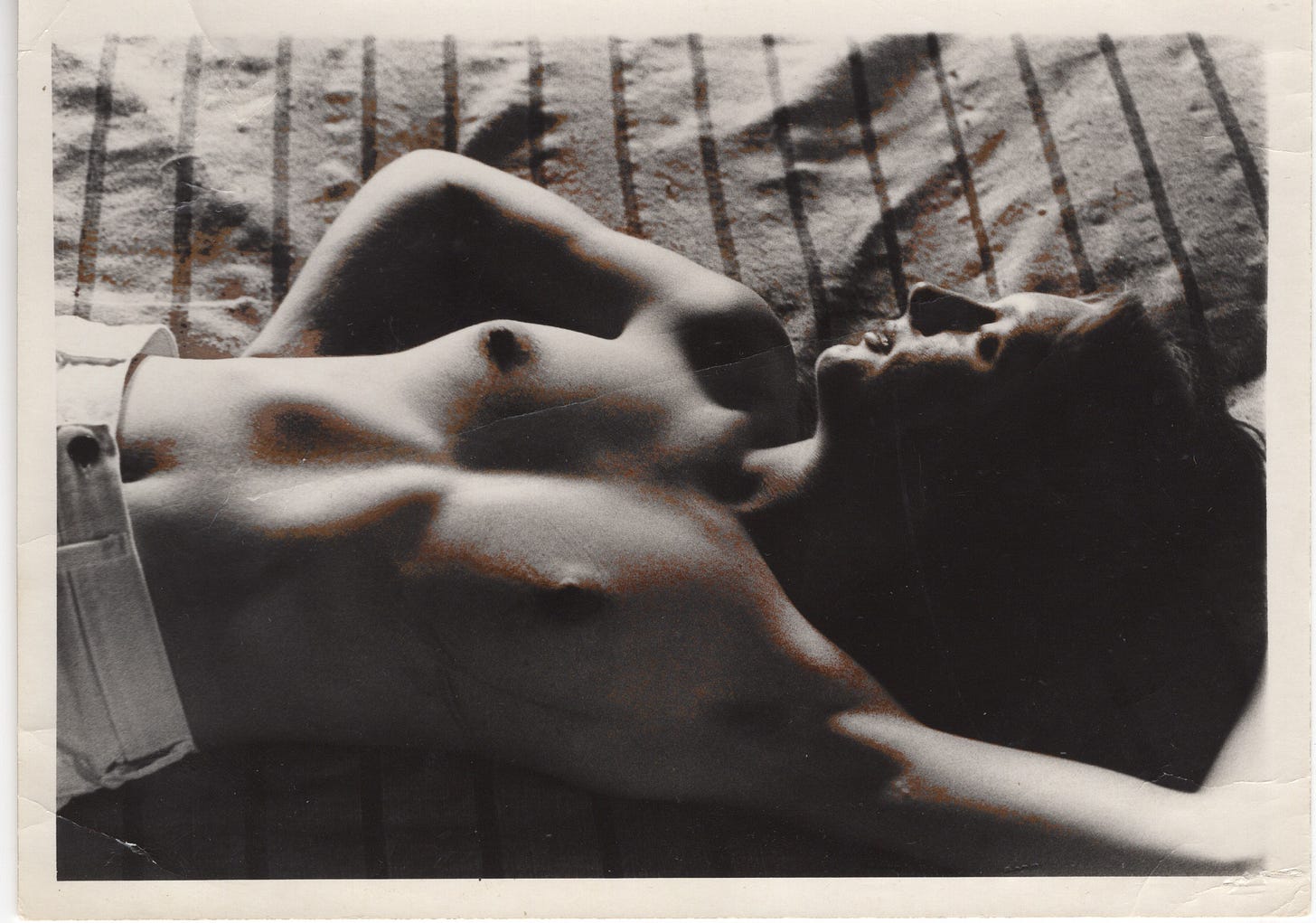I was impressed and taken aback when I came across Anaïs Nin's journal entries on her abortions. The timing was extremely pertinent, given the recent Supreme Court decision to overturn Roe. V Wade, thus stripping away the legal right to abortion care. I contemplated Nin's story, and thought of my mother, when she was young and faced with an unwanted pregnancy. I knew my mother was pro-choice, a black sheep in a staunchly conservative, religious family. Despite the contrasting outcomes and eras, they seemed connected. I decided to take a further look into both of their stories.
1. Anaïs Nin
“I sat in the studio, talking to my child. I told my child he should be glad not to be thrust into this black world in which even the greatest joys are tainted with pain, in which we are all slaves to material forces. He kicked and stirred. So full of energy, oh, my child, my half-created child that I will thrust back into the néant* again. Back into obscurity and unconscious, and the paradise of non-being.” - Anaïs Nin, 1934
Aside from her daring erotic short stories, Anaïs Nin is most well known for her diaries, and particularly for her tumultuous life and love affairs. When reading two volumes of her unexpurgated diary, Incest, and Mirages, I was struck by the way she discussed the ‘impossible’ pregnancy which resulted from her extra-marital affair with fellow writer Henry Miller, the illegal abortion procedure (which failed), and the subsequent, second abortion following a miscarriage. She describes her experiences and her thoughts with a rare frankness, especially for her time.
She describes her experience at the clinic for her second abortion, in 1940:
“The only wonderful moment in all this was when I was lying on a little cot in the doctor’s office and another woman came in. The nurse pulled the curtain so that I could not see her. She was made to undress and lie down, to relax. The nurse left us.
Soon I heard a whisper to me: “How was it?” I reassured her — told her how I had been able to bear it without ether, so it would be nothing with ether.
She said: “How long were you pregnant?”
“Three months.”
“I only two — but I’m scared. My husband is away. He doesn’t know. He must never know.”
I couldn’t explain to her that my husband knew, but that my lover had to be deceived and made to believe I had no relations with Hugh. Lying there whispering about the pain, I had never felt such a strong kinship with woman — woman — this one I could not see, or identify, the one who was also lying on a cot, filled with primitive fear and an obscure sense of murder, or guilt, and of an unfair struggle against nature — an unequal struggle with all the man-made laws against us, endangering our lives, exposing us to inexperienced maneuvers, to being economically cheated and morally condemned — woman is truly the victim now, beyond the help of her courage and aliveness. How much there is to be said against the ban on abortion.
“An unequal struggle with all the man-made laws against us, endangering our lives, exposing us to inexperienced maneuvers, to being economically cheated and morally condemned.”
What a tragedy this incident becomes for the woman. At this moment she is hunted down, really. The doctor is ashamed, deep down, but falsely so. Society condemns him. Everything goes on in an atmosphere of crime and trickery. And the poor woman who was whispering to me, afterwards, I heard her say to the doctor: “Oh, doctor, I’m so grateful to you, so grateful!”
That woman moved me so much. I wanted to know her. I wanted to pull the curtain and see her. But I realized she was all women — the humility, the thoughtfulness, the fear and the childlike moment of utter defenselessness. A pregnant woman is already a being in anguish.
Each pregnancy is an obscure conflict. The break is not simple. You are tearing away a fragment of flesh and blood. Added to this deeper conflict is the anguish, the quest for the doctor, the fight against exploitation, the atmosphere of underworld bootlegging, a racket.
The abortion is made a humiliation and a crime. Why should it be? Motherhood is a vocation like any other. It should be freely chosen, not imposed upon woman.”
She touches upon what many anti-abortion advocates fail to understand: that the pain one might experience when deciding to end a pregnancy does not mean that that decision is morally wrong. Nin understood it to be immoral, even impossible, to bring into existence a child that would not be wanted and loved.
“The pain one might experience when deciding to end a pregnancy does not mean that that decision is morally wrong.”
Why should the fetus’s life be valued as higher than that of her own life, of the lives of her husband and lover? She wrote in 1934, following her first abortion:
“I did not give myself to the earth or to the lifelong task of nursing a child. I love man as lover and creator. With him I feel an alliance. In man the father I feel an enemy, danger.”
It struck me how rather than shy away from considering the life growing inside her as both separate and as part of her, she embraced the doubt, the pain, and the existential dread. She understood that acknowledging the existential pain that may arise from an abortion does not negate or conflict with her right to choose.
“She understood that, acknowledging the existential pain that may arise from an abortion does not negate or conflict with her right to choose.”
2. My Mother
My mother showed me a photo of her my half-sister, Carrie, with her adoptive parents. Her elongated, angular face bore a striking resemblance to my mother, as if the circumstance of her birth had wiped away any trace of the father.
My mother, however, only sees him. “It’s hard to look at photos of her,” she told me recently on the phone, “she looks so much like her father. That’s why I haven’t met her yet... because I’m afraid that seeing her will bring the whole story back up again.”
Having been raised in a strict, Irish Catholic household, my mother wasn’t taught what she wontedly refers to as “the facts of life.” She was left to her own devices to learn about periods, sex, and pregnancy.
At seventeen, on a trip to Paris, she was raped by a man who offered to show her around. It was her first sexual experience. “You’re ruined,” her boyfriend told her after she confided in him, “my mother would never accept you now.”
After high school, she moved to Chicago to attend Oberlin college. In her free time, she enjoyed walking alone by the lake, collecting pieces of drift wood. It was there that she was approached by Rod, an older poet with a beautiful voice. He was the same age as her father. He worked on her, slowly gaining her trust over several months. When he first reached out to kiss her, she recoiled in fear, which piqued his curiosity. Like most predators, he had a keen sense for vulnerability.
“There’s a solution to that,” he said, as he extrapolated her past rape from her, “I can fix that.” He didn’t use a condom. She trusted him.
When her mother’s doctor phoned with the results of the pregnancy test, she was in shock. “But I don’t want to be pregnant,” she protested, “don’t say that” he said before abruptly hanging up, “I don’t want to hear that.” She returned to college without telling her family about the pregnancy.
It was 70’s post Roe vs. Wade, and much to the perplexity of her friends, my mother chose not to have an abortion. “I just decided to treat it as an experience, or as they called it in the 70’s, ‘a happening.’”
“I just decided to treat it as an experience, or as they called it in the 70’s, ‘a happening.’”
Her friends, many of whom had had one or more abortions, and many of whom did not envision motherhood for themselves, rallied around in support. “I thought, here I have the opportunity to provide a healthy baby to a couple who wanted a child.”
It might seem strange to juxtapose Nin’s brutally honest account with the story of my mother’s first pregnancy. It’s the kind of story the ‘Pro-Life’ camp might greedily reappropriate as a lesson on what one should and must do in similar circumstances. To do so would be missing the point entirely.
When I spoke to my mother on the phone, I pointed out that her story might be used to support arguments in favor of abortion bans, “It’s not because an egg is fertilized that it’s sacred,” she said defiantly, “fighting to protect any potential life at all costs is not doing a service to life itself.”
“It’s not because an egg is fertilized that it’s sacred,” she said defiantly, “fighting to protect any potential life at all costs is not doing a service to life itself.”
Like Nin, my mother’s decision to carry the pregnancy to term was not due any ascribed divinity to the circumstances, nor by whether what was growing in her uterus was alive or not. Both women considered the life they held in their hands – how carrying to term would alter their lives, and what kind of life they could offer a child.
Many abortion-rights advocates hedge conversations about life, fearing that by considering an embryo or a fetus as having life, they are conceding to the belief the termination of this life or potential life is immoral.
In this way, we’ve allowed anti-abortion advocates to dominate the conversation, and even allowed them to claim themselves as “Pro-Life.” Erroneous is the assertion that if one values life, one must protect all embryos and fetuses – and vice versa. It follows then, that if we are the consider the preciousness of life, that we must first consider the life (lives) that already is (are). We must consider the life that will be. We must consider life as a whole.















Thank you for sharing such a personal storie! so much needed right now! <3